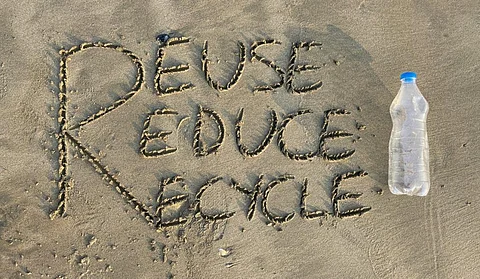

The concept of “Reduce, Reuse, Refill, Repair, Refurbish” presents a comprehensive strategy for addressing plastic pollution by promoting circular and resource-efficient consumption models. Each element of this framework is designed to minimise the environmental impact of plastics across their life cycles.
“Reduce” focuses on reducing overall plastic consumption and production by advocating for responsible consumption habits and alternative materials to minimise waste generation. Strategies like plastic bag bans and awareness campaigns play a crucial role in fostering reduced plastic use.
“Reuse” encourages the extended use of plastic products through the adoption of reusable alternatives, reducing the demand for single-use plastics and conserving resources.
“Refill” promotes refillable systems for household and personal care products, minimising packaging waste by allowing consumers to replenish products using refillable containers. Implementing refill stations in retail settings supports this initiative.
“Repair” emphasises the importance of repairing and maintaining plastic products to extend their lifespan, reducing disposal frequency and conserving resources. Encouraging repair services and designing products for easy repair contribute to waste reduction efforts.
Lastly, “Refurbish” involves upgrading or reconditioning plastic items to improve performance and appearance, delaying their entry into the waste stream and promoting longevity. Together, these principles foster a shift away from single-use plastics towards a more sustainable and circular approach to plastic consumption, aligning with broader efforts to combat plastic pollution and promoting environmental stewardship.
The European Union advocated for development of standards and guidelines for reuse and refill systems. It suggested measures such as use of regulatory and economic instruments to implement this provision. This further strengthens the provision. Africa requested for intersessional work for clarity and better understanding of the issue. Iran agreed to time-bound targets, despite opting for the weakest possible option.
The US opted a fresh option and disagreed to most of the elements of the provisions like reducing plastics, implement refill and reuse systems, and time-bound targets, thus weakening the obligation. India aligned with the US by not agreeing to reduction or time-bound targets for implementing these options.
Russia agreed to reuse and recycle, while Japan preferred recycling targets over reuse, refill or repair targets. Brazil expressed its concern claiming that activities such as refilling may actually lead to use of more plastics.
To download the whole report, click here.
This is a click to zoom map. View the larger image by clicking on it